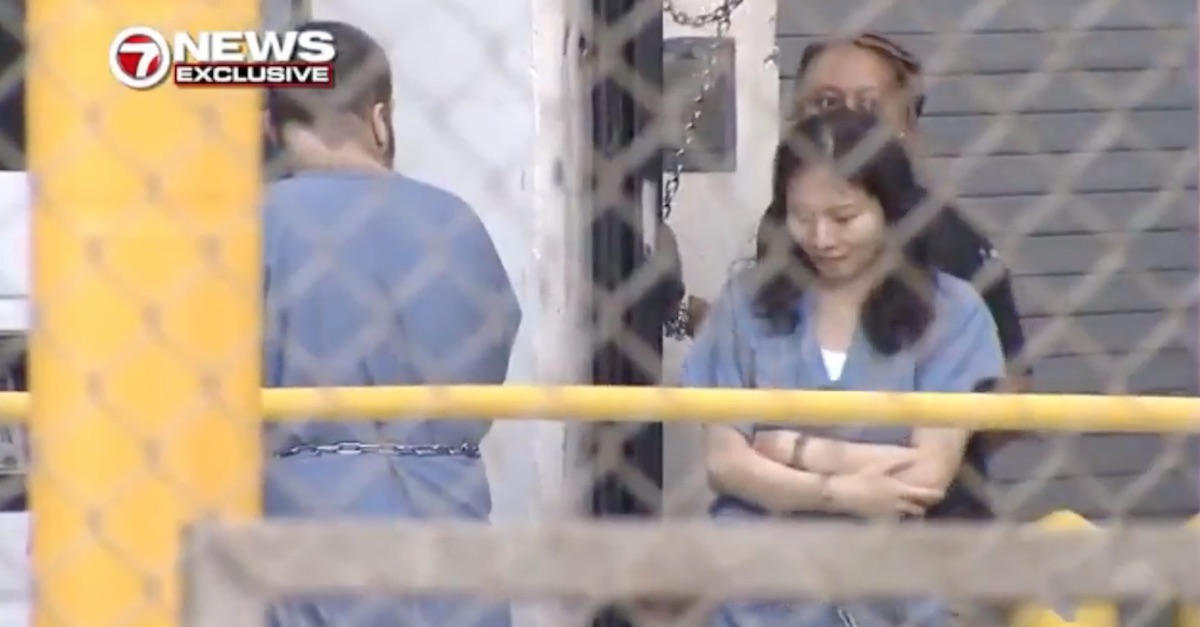
A 33-year-old Chinese national who was found to have multiple cell phones and malware on her person after an early April arrest at President Donald Trump‘s Mar-a-Lago club has been found guilty of lying to a federal agent and trespassing, meaning she faces up to six years behind bars.
Sentencing is scheduled for Nov. 22.
As Law&Crime reported before, the government alleged that Yujing Zhang attempted “to gain access into the Mar-a-Lago club” which is designated a “Restricted Building or Grounds” by the U.S. Secret Service under the terms of a federal statute authorizing such temporary designations.
The filing said that Zhang told Special Agent Krystle Kerr “that she was there to go to the pool” and subsequently presented “two Republic of China passports as identification.” The passports were then passed on to Mar-a-Lago security who attempted to verify that Zhang was on the club’s “access list.” Zhang said she was “going to the pool” and a manager eventually told security that Zhang was “the last name of a member at the Mar-a-Lago club.”
Zhang was asked if the other Zhang was her father, “but she did not give a definite answer,” the document claims. Zhang was also asked if she was at Mar-a-Lago to meet anyone but allegedly didn’t give a definitive answer to that question either. She was then given access to the property.
Once inside, a receptionist said she repeatedly asked Zhang why she was there and that Zhang eventually told her she was there for a “United Nations Chinese American Association event later in the evening.” The problem was that no such event existed. The receptionist then went back to the access lists and determined Zhang shouldn’t have been at the club. That’s when the Secret Service got involved.
Zhang then allegedly told Special Agent Samuel Ivanovich she was there in order to attend a “United Nations Friendship Event” and that she came early to “familiarize herself with the property and take pictures.” Zhang then allegedly produced Chinese language materials which she claimed was her invitation to the event.
A resulting search of Zhang’s person turned up various electronic devices in her possession. Per the government, Zhang had “a total of four cellular telephones, one lap top computer, one external hard drive type device, and one thumb drive.” After giving consent for the agents to search the devices, a “preliminary forensic examination of the thumb drive determined it contained malicious malware.”
Zhang was most recently criticized by U.S. District Judge Roy Altman when she showed up to court in a brown inmate’s uniform, rather than civilian clothes. A bizarre exchange ensued.
Speaking in Mandarin, Zhang said she was lacking in “undergarments.”
“You have no undergarments in your cell?” Altman asked.
“No,” Zhang replied.
“You should wear your civilian clothes so the jurors don’t see you in your prison garb,” Altman advised the defendant, noting that appearing in her inmate’s uniform could potentially prejudice the jury against her. Zhang then said she didn’t understand what Altman was trying to convey.
During closing arguments on Tuesday, Assistant U.S. Attorney Rolando Garcia said Zhang clearly lied when she said that she was at Mar-a-Lago for a United Nations Chinese American Association event.
“She said she was there for a United Nations friendship event. Well, that was a clear lie,” Garcia said. “She was bound and determined to get on that property […] She lied to everybody to get on that property.”
Zhang, for her part, claimed she “did nothing wrong” and “did no lying,” maintaining her innocence until the end.
As the Miami Herald noted, the real reason Zhang showed up at Mar-a-Lago that day was never explained.
The incident raised suspicions that the feds were conducting a possible espionage probe.
Colin Kalmbacher contributed to this report.
[Image via screengrab/WSVN]